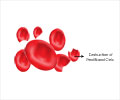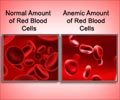New therapy with sutimlimab improves severe hemolytic anemia in cold agglutinin disease, a rare blood disorder.

"The drug was well tolerated, produced clinically meaningful increases in hemoglobin levels, and precluded the need for transfusions, even in patients for whom multiple prior therapies had failed," said senior author Bernd Jilma, MD, of the Medical University of Vienna.
Cold agglutinin disease is thought to affect about 10,000 people in the United States and Europe. Most patients with the disease are over 50 years old.
To date, there are no U.S. Food and Drug Administration (FDA)-approved treatments for cold agglutinin disease, though rituximab-- a treatment for certain blood cancers -- has been used with or without chemotherapy with limited success.
This study included 10 patients 56-76 years old. Patients had cold agglutinin disease for a median of five years, and many had received multiple prior treatments that had been unsuccessful. At enrollment, all patients had below-normal levels of hemoglobin, a component of red blood cells that is responsible for transporting oxygen to cells and organs throughout the body. Six patients were receiving regular blood transfusions to control their symptoms.
Advertisement
When sutimlimab treatment was discontinued and the drug had left the patients' blood, hemoglobin levels dropped and destruction of red blood cells began again. However, when treatment resumed, these effects were once again reversed. The six patients who had been sustained by regular blood transfusions remained transfusion-free for up to 18 months while receiving sutimlimab treatment. "Provided that safety results remain positive, sutimlimab could become the first approved treatment for cold agglutinin disease," Dr. Jilma said.
Source-Eurekalert















